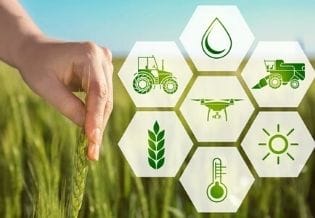Aims & Scope
Journal of Precision Agriculture (JPA) publishes research that advances data-driven agricultural production systems through spatial variability analysis, sensor technologies, and decision support systems to optimize crop yields, resource efficiency, and environmental sustainability.
Core Research Domains
Precision Crop Management
Technologies and methodologies for optimizing crop production through spatial and temporal variability analysis.
- Variable rate application systems (fertilizers, pesticides, irrigation)
- Crop growth monitoring and yield prediction models
- Precision phenotyping and trait analysis
- Site-specific nutrient management strategies
- Precision weed and pest management systems
- Crop disease detection using sensor technologies
"Development of a multi-sensor fusion system integrating hyperspectral imaging and soil electrical conductivity mapping to optimize nitrogen application rates in wheat production, demonstrating 18% reduction in fertilizer use while maintaining yield."
Agricultural Sensing & Remote Sensing
Sensor technologies, data acquisition systems, and remote sensing applications for agricultural monitoring.
- Proximal and remote sensing platforms (UAV, satellite, ground-based)
- Multispectral and hyperspectral imaging for crop assessment
- Soil sensor networks and real-time monitoring systems
- LiDAR and 3D crop structure analysis
- Thermal imaging for irrigation management
- Sensor calibration and validation methodologies
"Validation of a UAV-based multispectral imaging system for early detection of water stress in vineyards, comparing NDVI, NDRE, and thermal indices against ground-truth measurements across three growing seasons."
Geospatial Analysis & Decision Support
Geographic information systems, spatial modeling, and computational tools for precision agriculture decision-making.
- GIS-based spatial analysis for field variability mapping
- Geostatistical methods and interpolation techniques
- Prescription map generation and optimization algorithms
- Decision support systems for farm management
- Yield mapping and spatial yield analysis
- Management zone delineation methodologies
"Development of a machine learning-based decision support system integrating multi-year yield data, soil properties, and weather patterns to generate dynamic management zones for variable rate seeding in corn production."
Agricultural Robotics & Automation
Robotic systems, autonomous vehicles, and automation technologies for precision agricultural operations.
- Autonomous navigation systems for agricultural vehicles
- Robotic harvesting and selective crop management
- Machine vision for automated crop monitoring
- Precision planting and seeding robotics
- Automated irrigation control systems
- Swarm robotics for distributed field operations
"Design and field evaluation of an autonomous robotic platform for targeted herbicide application using real-time computer vision-based weed detection, achieving 85% reduction in herbicide use compared to broadcast application."
Secondary Focus Areas
Data Science & Analytics
- Big data analytics for agricultural systems
- Machine learning algorithms for crop prediction
- Deep learning for image-based crop assessment
- Data fusion from multiple sensor sources
- Cloud computing platforms for farm data management
Soil Science & Management
- Soil spatial variability characterization
- Precision soil sampling strategies
- Soil health indicators and monitoring
- Soil-crop modeling for site-specific management
- Soil carbon sequestration quantification
Irrigation & Water Management
- Precision irrigation scheduling systems
- Soil moisture sensor networks
- Evapotranspiration modeling for irrigation
- Deficit irrigation strategies
- Water use efficiency optimization
Agricultural Engineering
- Precision equipment design and optimization
- GNSS and RTK positioning systems
- Implement control systems for variable rate application
- Sensor integration and data acquisition systems
- Agricultural machinery automation
Crop Modeling & Simulation
- Process-based crop growth models
- Yield prediction and forecasting systems
- Climate-crop interaction modeling
- Model calibration and validation methods
- Scenario analysis for management optimization
Specialty Crop Applications
- Precision viticulture and wine grape management
- Precision horticulture for high-value crops
- Orchard management systems
- Greenhouse automation and control
- Controlled environment agriculture
Out of Scope
Clinical Veterinary Medicine & Animal Health
Studies focused on veterinary clinical practice, animal disease diagnosis, therapeutic interventions, or animal welfare without precision livestock management technology components. Rationale: JPA focuses on crop production systems and agricultural technology, not animal health sciences.
Food Processing & Post-Harvest Technology
Research on food processing methods, storage technologies, packaging, or food safety without direct connection to precision agriculture production systems. Rationale: Post-harvest activities fall outside the field-level production focus of precision agriculture.
Agricultural Policy & Economics Without Technical Innovation
Purely policy analysis, market studies, or socioeconomic research without integration of precision agriculture technologies or methodologies. Rationale: JPA prioritizes technical and methodological advances; policy papers must demonstrate technology adoption analysis or innovation diffusion.
Human Nutrition & Health Outcomes
Studies examining human dietary patterns, nutritional interventions, or health outcomes from food consumption. Rationale: JPA focuses on agricultural production systems, not human health sciences or nutritional epidemiology.
General Agronomy Without Precision Technology
Traditional agronomic studies (variety trials, tillage comparisons, fertilizer rates) that do not incorporate spatial variability analysis, sensor technologies, or precision management approaches. Rationale: JPA requires demonstration of precision agriculture methodologies beyond conventional agronomic research.
Article Types & Editorial Priorities
Editorial Standards & Requirements
Reporting Guidelines
- Field experiments: CONSORT-style protocols with site characterization
- Observational studies: STROBE guidelines adapted for agricultural research
- Modeling studies: ODD protocol for model documentation
- Sensor validation: ISO/IEC standards for measurement accuracy
- Algorithm development: Transparent reporting of computational methods
Data & Code Availability
- Raw data deposition in public repositories (Zenodo, Figshare, Dryad)
- Code sharing via GitHub or institutional repositories
- Geospatial data: include coordinate reference systems and metadata
- Sensor data: provide calibration coefficients and processing workflows
- Proprietary data: detailed description of access procedures
Ethics & Compliance
- Field trial registration for multi-site studies
- Environmental impact assessments for novel technologies
- Conflict of interest disclosure for industry-funded research
- Intellectual property statements for patented technologies
- Biosafety protocols for GMO field trials
Preprint & Prior Publication
- Preprints on arXiv, bioRxiv, or AgriXiv are welcomed
- Conference proceedings: extended versions considered if substantially expanded
- Thesis chapters: acceptable if not previously published in peer-reviewed journals
- Duplicate submission: strictly prohibited and grounds for rejection
- Self-plagiarism: text recycling limited to methods sections with citation
Publication Metrics & Performance
Ready to Submit Your Research?
If your work aligns with our scope and meets our editorial standards, we invite you to submit your manuscript. Our editorial team is committed to fair, rigorous, and timely peer review.
Contact Editorial Office

